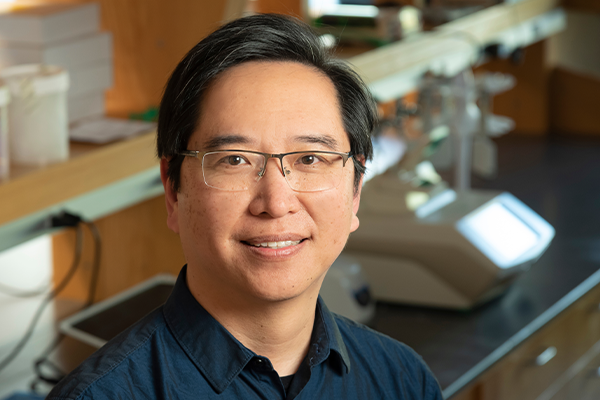
Lee Zou, PhD, joined the Duke faculty in March 2023 as chair of the Department of Pharmacology and Cancer Biology in part because of the very collegial environment he found in Durham.
He was previously professor of pathology at Harvard Medical School and scientific co-director of Massachusetts General Cancer Center. Both Harvard and Duke have excellent scientists, he said, but at Duke he sees more opportunities to build collaborations.
“People at Duke are doing original science, they’re thoughtful. They take time to work with colleagues,” he said. “Everybody’s helping each other to succeed.”
Zou is excited to lead a department that is already very strong, and "uniquely positioned right between basic science and the large cancer research community,” he said.
As Zou recruits new cancer biologists, he'll be looking for early career scientists who bring new research directions, and he aims to strengthen his department's already robust connection to translational and clinical researchers.
The department has already had many successes in translating discoveries from the lab to the clinic. One of the most high-profile examples happened earlier in 2023 when a drug developed in the lab of former department chair Donald McDonnell, PhD, Glaxo-Wellcome Distinguished Professor of Molecular Cancer Biology, was approved by the Food and Drug Administration to treat advanced breast cancer.
The department is in a unique position because it combines cancer biology and pharmacology, Zou said. Most other institutions have those disciplines divided. Because of the combined department at Duke, Zou sees potential to expand the development of new therapeutics, build biotechnology companies, and take new treatments all the way to the clinic.
Only in the last 15 years, as scientists have learned more about the drivers of cancer, has cancer therapeutics become a major focus of drug development, Zou said. "The space is wide open, so this will be a next chapter for pharmacology.”
Trained as a molecular cell biologist, Zou started out as a young investigator focusing on a very fundamental question: how do human cells repair DNA damage? But he gradually started applying his work to clinical problems. “I spent more than 10 years gradually broadening my research direction from very basic cell biology all the way to drug development and then to clinical trials,” he said. “I realized how much impact basic science can make on cancer research.”
David MacAlpine, PhD, professor of pharmacology and cancer biology, who also studies DNA replication, expressed excitement that Zou has joined the department as chair. “With Dr. Zou joining our ranks, we not only gain a renowned scholar in the field of genome integrity, but also a leader whose approach to science encapsulates the department's ethos of seamless integration between basic research and translational advancement,” MacAlpine said.
In Zou’s research, interactions with clinicians give him an appreciation for the right questions to ask. “You need to have that connection,” Zou said. “What are the urgent needs in the clinic? What are the major challenges? Then we need a group of basic scientists who can design experiments to answer those questions. We need everyone in that positive feedback loop to keep things moving forward.” For instance, in November his team published results from studies about DNA mismatch repair that provides a possible answer to an urgent clinical question – how to treat some tumors that don’t respond to current immunotherapies.
Zou said that Duke's pharmacology and cancer biology department has two very strong PhD programs, one in molecular cancer biology, and the other in pharmacology. Students in those programs interact frequently. Zou aims to encourage more interactions with other PhD programs in the School of Medicine. "In the ideal situation, all the departments will contribute their expertise, their strength, and then we train students in a more connected, coordinated way," he said.
Zou has earned recognition with numerous honors and awards, including the National Cancer Institute’s Outstanding Investigator Award, the Kraft Prize for Translational Research, and the Breakthrough Award from the Department of Defense. He is a Fellow of the American Association for the Advancement of Science, and he serves on the editorial boards of Molecular Cell, Molecular and Cellular Biology, the Journal of Biological Chemistry, and Cancer Research.